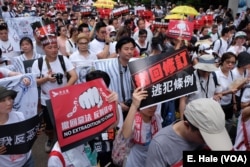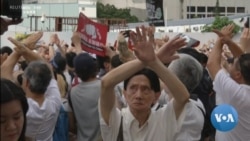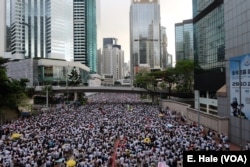Hundreds of thousands of Hong Kongers from all ages and walks of life marched on Sunday against a legislative bill that would allow people to be extradited to mainland China to face charges, in the largest demonstration city has seen in years.
Protesters carried banners condemning the proposed law, which would modify Hong Kong's Fugitive Offenders Ordinance.
Others carried signs calling for the resignation of Chief Executive Carrie Lam, who has championed the bill despite the fact it has been criticized by a wide range of groups from the Hong Kong Law Society to the American Chamber of Commerce. Critics say China's legal system would not guarantee the same rights to defendants as they would have in semi-autonomous Hong Kong.
From mid-afternoon until well past nightfall, hundreds of thousands poured in from a major Hong Kong roadway to gather outside Legislative Council, the city’s semi-democratic legislature that is currently debating the bill.
Civil Human Rights Front, the protest organizer, estimated the crowd to be more than one million while Hong Kong police said peak participation saw 240,000 people on the streets.
Unlike Hong Kong’s attendees of regular protests on July 1 and October 1, the anniversary of reunification with China and China’s national day, many protesters on Sunday said they rarely attend demonstrations.
WATCH: Protesters arrested
“We don’t like the law that the Chinese government can prosecute [us],” said Edwin Lo. “We don’t like the Chinese government should overrule Hong Kong. We want to protect the freedoms in Hong Kong,”
Lo said he had last attended a protest in 2003, when half a million Hong Kongers rallied against national security legislation — a common refrain from many of Sunday’s protesters.
Many also said they felt that the ordinance was a sign that Beijing was infringing on 50 years of autonomy promised to Hong Kong, a former British colony.
Kay Lam, who attended the protest with several friends, said the feeling amongst many protesters was the same — they might not change anything but they still needed to demonstrate.
“No matter what, no matter they listen to us or not we have to step out, because it is to show not only the Hong Kong government but the people around the world that we have a voice and we disagree with what they are doing,” Lam said. “Whether they will listen to us is up to them. As a local resident here in Hong Kong we have the responsibility to at least step out here and show up.”
An amendment to the Fugitive Offenders Ordinance was introduced in April and is set to be voted on June 12 by Legislative Council, whose majority is held by pro-establishment legislators.
If passed, it would allow the city to extradite suspected criminals to other jurisdictions where it lacks a permanent extradition agreement, including China and Taiwan, on a case by case basis. Chief Executive Carrie Lam has previously said that such changes would close legal “loopholes.”
The bill follows a high profile murder case last year where a Hong Kong man murdered his pregnant girlfriend on holiday in Taiwan. The government has said speed in the case is necessary as the murder suspect, who is serving a prison sentence on related money laundering charges, could be released as early as October.
The changes, however, and the speed at which they have been introduced have raised international concern about the future of Hong Kong’s legal system and its global reputation.








